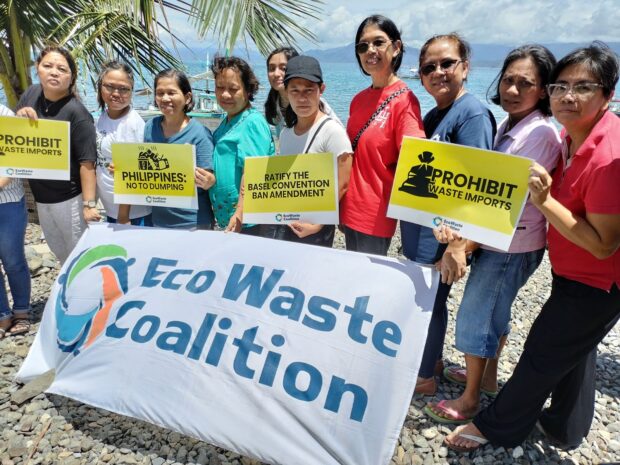Gov’t told: Ban importation of waste in PH, protect Filipinos’ health, environment

Photo courtesy of EcoWaste Coalition
MANILA, Philippines — An environmental group on Thursday appealed to the government to ban the importation of wastes into the country, warning of the hazards it poses to people’s health.
EcoWaste Coalition reminded President Ferdinand Marcos Jr. to ratify the Basel Convention Ban Amendment, noting they had sent letters to the Chief Executive and Department of Environment and Natural Resources Secretary Maria Antonia Loyzaga regarding the matter in January.
“To protect human health and the environment, upstream and downstream, and prevent environmental injustice, in particular in developing and transition countries, all Basel Parties should ratify (the amendment) at the earliest possible date,” the group said, citing a primer published by the Basel Action Network and the International Pollutants Elimination Network.
EcoWaste said the Philippines had ratified the Basel Convention on the Control of Transboundary Movements of Hazardous Wastes and Their Disposal in 1993, but it has yet to ratify the Ban Amendment.
The Basel Convention Ban Amendment “prohibits the export of hazardous wastes from developed to developing countries for reuse, recycling, recovery operations, and other reasons.”
The Basel Convention Ban Amendment “became an international law upon its entry into force on December 5, 2019.”
EcoWaste remembered the arrival of a shipload of mixed garbage from South Korea in 2018, which was wrongly declared as “plastic synthetic flakes.”
READ: 3 Koreans face raps for trash import
“As we recall this deplorable dumping incident, we remember with pride the patriotic stance taken by our vigilant customs, environmental and local government authorities in Region 10, together with the civil society, not to allow the Korean waste to be landfilled or incinerated in Mindanao,” EcoWaste Coalition National Coordinator Aileen Lucero said in a statement Thursday.
“Together, we insisted that the illegal waste shipments should be returned to its origin, consistent with the provisions of the Basel Convention,” she added.
READ: Last batch of imported trash sent back to South Korea
The shipload of mixed garbage was imported by Verde Soko Philippines Industrial Corp. and unloaded at ports in Villanueva and Tagoloan, Misamis Oriental on July 21 and October 21, 2018. It was said to be “the biggest volume of smuggled waste that was apprehended in this country,” EcoWaste said, citing the Bureau of Customs (BOC)-Region 10.
“Found in the bulk and containerized shipments were mixed plastic materials, used dextrose tubes, soiled diapers, discarded electronics and household trash in violation of the Basel Convention and national customs and environmental laws,” EcoWaste added.
READ: DENR seeks return of trash to Korea
Upon discovery, the group said BOC-10 issued warrants of seizure and detention and a re-exportation order against the illegal waste imports from South Korea.
Following the smuggling incident, EcoWaste said it wrote to then President Moon Jae-in requesting “to immediately act on this pressing issue and not allow the controversy to drag on like what happened to the infamous garbage from Canada that finally left the Philippines after six long years.”
READ: Customs official cited for return of trash to Korea
This negotiation, the group noted, has led to the return of illegal shipments comprising 364 containers, or 7,408 metric tons, to South Korea in seven batches from January 13, 2019 to September 15, 2020, amid the height of COVID-19 pandemic.
RELATED STORIES
EcoWaste warns public: Children’s toys contain potentially harmful chemicals
EcoWaste to Manila malls: Stop selling mercury-containing cosmetics
South Korea to phase out industrial waste imports